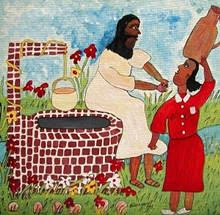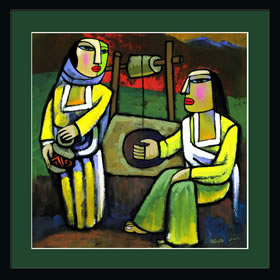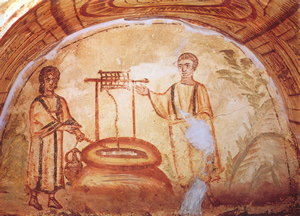The Last and Best Word:
"The Grace of the Lord Jesus Be With All"
For Sunday May 16, 2010
Lectionary Readings (Revised Common Lectionary, Year C)
Acts 16:16–34
Psalm 97
Revelation 22:12–14, 16–17, 20–21
John 17:20–26
In church a few years ago our pastor told about a woman in Atlanta who had enrolled in a psychology program at a local university. One class assignment required her to identify the sort of person that she most feared, and then to find and meet just such a person. This Christian woman admitted that she most feared gay people and so, to her credit, she followed the assignment and befriended some gays.
The fears of her classmates were even more revealing. A full 40% of the students in her class said that the people they most feared were Christians.
 |
Michael Parchment's "Woman at the Well" (Jamaica). |
Did these students rightly fear Christians? Are Christians scary people? The purpose of the class exercise was to show students how easily we stereotype people without even knowing them, and how we can dispel unjustified fears by meeting people whom we find strange. So maybe Christians aren't quite as bad as the media sometimes suggests.
There's some truth in that, but to hide behind that fig leaf let's us off the hook too easily.
In his film Lord, Save Us From Your Followers (2008), director Dan Merchant wonders why a gospel of love so bitterly divides people. He wears a jump suit plastered with all sorts of religious cliches, and then interviews people on the street about his nagging question. I didn't think this was a great movie, but it sure asks a great question. In the final part of the film Merchant sets up a "confession booth" at a Portland gay pride festival, only this time he was the one confessing the sins of believers to the people who stopped by his booth.
I also keep mulling over the observation of the New Testament scholar Marcus Borg of Oregon State University. In a footnote to his book The Heart of Christianity, he says that when he asks his unchurched university students to write a short essay about their impressions of Christianity, “they consistently use five adjectives: they think Christians are literalistic, anti-intellectual, self-righteous, judgmental, and bigoted.”
Another one of our pastors suggested that Christians have a "branding" problem. Kim observed how companies go to great lengths to brand themselves in ways that communicate not just a catchy slogan or a superficial tagline but their core identity, what they most want the public to think of when they hear their name. Good branding is powerful; just think of all the corporate jingles that you can't get out of your head even if you tried. Think of Tiger Woods.
 |
He Qi: "Woman at the Well". |
Kim then proposed a thought experiment: "What do you think the average person on the street, in the grocery store, at the gas station would come up with if we went around and asked them to sum up in just a few words what the Christian church was all about? In many cases our branding tag line would be something like — 'We’re right. . . you’re wrong. Let us correct your behavior. Give us your money for something irrelevant to your life. Withdraw from normalcy and join our weird little subculture. Welcome to worship. . . and let us tell you how to vote.' Whether we like it or not, we have been branded in these ways by a culture that for the most part sees the church primarily outside of the mainstream of current life."
The Bible is a mini-library of 66 books, written mainly in Hebrew and Greek by about 40 authors across more than a thousand years. It's long (my Bible is 1,635 pages), has many plot twists, and is rooted in ancient cultural settings that are foreign to us today. But can we "brand" the Bible's story? What would be its singular tagline? Can we reduce its myriad complexities to an essential substance that clarifies and enlightens rather than reduces and oversimplifies?
Yes, we can. The lectionary for this week does exactly that. The very last sentence of the Bible reads, "The grace of the Lord Jesus be with all" (NASB, Revelation 22:21).
That's the Bible's branding, and it ought to be ours, too. Not a narrow political ideology whether left or right, not a specious theory rooted in junk science, nor judgmentalism of others that is eager to exclude people unlike ourselves. We could even reduce our branding from one sentence to one word: grace.
 |
Woman at the Well, Roman catacomb. |
Some variants in the original Greek propose a different reading for Revelation 22:21 that narrows the appeal for grace to "God's people" (NIV) or "the saints" (ASV, NRSV). But as pastor Rob Bell has observed, the Gospel is good news especially to those who don't believe it. So, I like the reading of the New American Standard Bible, which retains the expansive nature of God's grace by translating the Greek in a strictly literal if awkward way: "The grace of the Lord Jesus be with all."
Even Psalm 97 for this week has as its purview "all the earth" (97:1,5,9), "the world" (97:4), and "all the peoples" (97:6), which is rather remarkable for an ancient liturgical text written for "the villages of Judah" (97:8).
God's lavish love, without conditions or limits, for all people; that's our branding. The apostle Paul also pushes the parameters of divine grace, not only beyond "the saints" but even beyond humanity. He says that God was in Christ reconciling the whole creation and the entire cosmos to Himself (2 Corinthians 5:19).
The God whom Jesus revealed isn't mean or scary, and if we reflect h\is image people need not fear his followers. Rather, said Jesus, he's the sort of God who throws a party for a kid who wasted the family fortune, who refuses to condemn a woman caught in the act of adultery, who breaks taboos of ethnicity and gender to encourage a woman who had been married five times, who welcomes a criminal into his kingdom as the man gasps his last breaths while being executed, and who embraces his closest disciples even though they abandoned him and denied even knowing him.
 |
The Woman of Samaria at the Well, Duccio di Buoninsegna, c 1300. |
In the wonderful (and eminently readable) Lives of the Desert Fathers, written toward the end of the fourth century, the anonymous author begins his preface with how most of people viewed the monks. He characterizes those desert dwellers as defenders and guardians of all humanity: "The people [in Egypt] depend on the prayers of these monks as if on God Himself. . . it is clear to all who dwell there that through them the world is kept in being, and that through them too human life is preserved and honored by God."
And so the last page of the Bible welcomes everyone with these words: "Let him who hears say, 'Come!' Whoever is thirsty let him come; and whoever wishes, let him take the free gift of the water of life" (Revelation 22:17).
For further reflection:
* In your experience do people "fear" Christians? If so, why? Do you think their fears are justified?
* Can you think of Christians who break this stereotype and who are graceful, gracious, and welcoming to all?
* Consider extending grace not only to others but to yourself.
* Cf. Donald McCullough: "Grace tells us that we are accepted just as we are. We may not be the kind of people we want to be, we may be a long way from our goals, we may have more failures than achievements...but we are nonetheless accepted by God, held in his hands. Such is his promise to us in Jesus Christ, a promise we can trust."
* See Philip Yancey, What's So Amazing About Grace?.
Image credits: (1) AviscaCaribbeanArt.com; (2) HeQiGallery.com; (3) Belmont University; and (4) Mount Saint Agnes Theological Center for Women.





